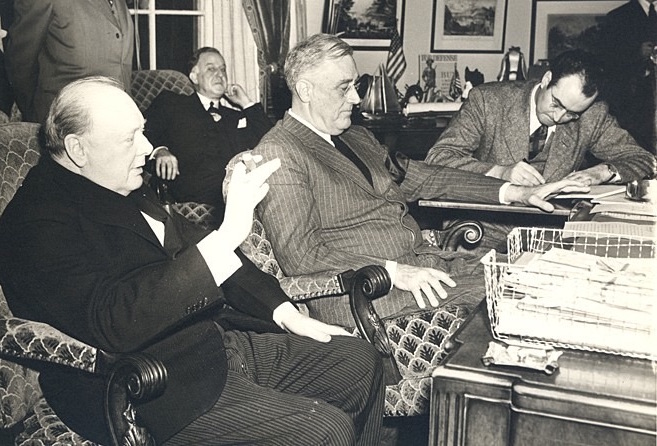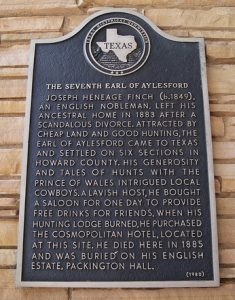
Churchill and Texas: The Complete History
Q: Was Churchill ever in Texas?
A. No, but he was an Honorary…
The closest Churchill came to visiting Texas was in 1938, when he planned a series of lectures beginning at Fort Worth and Dallas. It was to have lasted six weeks in November and December. The Munich Crisis interfered and the lecture tour was cancelled.
Churchill was, however, an Honorary Freeman of the City of Dallas. In the 1970s Dallas boasted a neo-Victorian night spot called the Churchill Club. It was decorated with the great man’s pictures and quotations. There were Union Flags and a letter from WSC accepting his Freemanship of the city. Dallas also has a Churchill Park, located at 7025 Churchill Way.
Here are some other Churchill-Texas associations…
After Pearl Harbor
Press Conference, Washington, 23 December 1941, following Japan’s attack on Pearl Harbor. (Cited in Robert Pilpel, Churchill in America, 147):
Texas Reporter: “Mr. Minister [sic], can you tell us when you think we may lick these boys?” [Pause while someone explained to WSC the meaning of the American slang, “lick.”]
Churchill: “If we manage it well, it will take only half as long as if we manage it badly.”
Texas reporter: “Mr. Prime Minister, in one of your speeches you mentioned three or four of the [war’s] great climacterics. Would you now agree that our entry into the war is one of these, sir?”
Churchill: “I think I may almost say [affecting a Texas drawl] Ah sho’ do!”
“Why We’re Winning”
In his memoir, Happy Odyssey (251) Lt. Gen. Adrian Carton de Wiart, Churchill’s personal representative to Chiang Kai-shek recalled:
I was also acting as Lord Mountbatten‘s liaison officer…. Dicky Mountbatten is a curious mixture of royal-democracy; he can mix equally well on a high or low level and be exactly right in each…. He was inspecting some American posts, and it was obvious that the Americans had been well primed beforehand as to their behaviour. All went swimmingly until Mountbatten came up to a certain sentry who immediately stretched out his hand and said: “I’m Brown from Texas.”
Mountbatten, not the least taken aback, shook the outstretched hand and answered: “There are a lot of you Texans out here.”
Whereupon the soldier replied: “Yes, that’s why the war’s going so well.”’
Texas Fan Mail, 1899
Reverend W.K. Lloyd, Church of the Holy Cross, Paris, Texas, to WSC, 19 November 1899:
My Dear Sir, I cannot refrain from writing you stranger tho I be to tell you how proud we Texas Englishmen are of you. When we see the best blood of England fighting side by side with “Tommy Atkins” and performing such deeds of valor, many like myself would give up everything to be in the “mix up” [Anglo-Boer War] too, but alas, we are not the favoured ones this time. Go on old man and show the world what Englishmen are still made of and may the Good Father of all preserve your valuable life.
Rev. Lloyd had served as a Captain in the 3rd Texas Infantry during the Spanish-American War. Reported in The Churchill Documents, vol. 2.
“Sporting Joe” Aylesford
Joseph Heneage Finch (1849-1885), 7th Earl of Aylesford, was known for his horse racing and gambling pursuits as “Sporting Joe.” His wife Edith was even more sporting, entertaining Lord Blandford, Winston Churchill’s uncle (later the 8th Duke of Marlborough), as well as HRH The Prince of Wales (later King Edward VII).
When his brother was named as a correspondent in the inevitable divorce proceedings, Lord Randolph Churchill threatened to reveal incriminating letters proving that Blandford wasn’t the only cuckold and HRH no less a cad. Infuriated, HRH refused to attend any social event where Lord Randolph was present. To avoid being frozen out of London society, the Churchills, including young Winston, went into temporary exile in Ireland.
After his divorce, Sporting Joe migrated to America. In 1883 he bought 27,000 acres at Big Spring, Texas. There he flourished as a dude rancher until his death from cirrhosis at age 36.
Here Come da Judge

Aylesford arrived with a “carload” of horses, dogs, English saddles and riding togs. Dismayed to find no foxes to hunt, he made do with antelopes and coyotes. Known by locals as “The Judge,” he scraped by on $50,000 a year (about $1.5m today). Popular with Texans, he frequently picked up the tab at drinking parties. His ranch had a pile of empty whisky bottles said to be “as big as a haystack.”
In January 1885, saying “Goodbye boys,” Sporting Joe left a card game, went to his room, climbed into bed, pulled the blanket up to his chin, and died. His doctor prepared his body for shipment back to England. He described the liver as being not unlike a rock.
Anita Leslie wrote in Edwardians in Love, 122:
Lord Blandford, having shed the promiscuous Edith Aylesford, married a kindly rich American widow whom he deceived with the glamorous nymphomaniac Lady Colin Campbell, whose naked picture by Whistler would eventually be torn to shreds by his outraged wife. (A pity, for today’s museums are short of Whistlers.)
As Lady Randolph Churchill is reported to have said (but maybe didn’t): “It doesn’t really matter what one does, as long as one doesn’t do it in the street and frighten the horses.”
Moreton Frewen, aka “Mortal Ruin”
Moreton Frewen (1853-1924), Winston’s uncle, married Clara Jerome and badly edited the first edition of Winston’s first book, The Story of the Malakand Field Force. He was known as “Mortal Ruin” for his many financial disasters. Ralph Martin wrote in Jennie vol. 1):
A tall, assured sportsman, known as one of the best gentleman riders in England, he explored the buffalo trails of Texas, and had known every one there from Buffalo Bill to Sitting Bull. “A bad man with brown eyes need not be feared,” Frewen wrote, “but the fellow with grey eyes or grey-blue whose eyes grew darker as they looked down a gun—that was the sort of man to reckon with.” [The Lone Ranger would have put a fright into him.]
Moreton’s main interest was in his 45,000 head of cattle. But wise as he supposedly was to the ways of the West, he once stood on a hilltop and bought the same herd of 7,000 cattle three times, while Texan ranchers drove them in a circle around the hill.
Thus endeth the Encyclopedia of Winston Churchill and Texas.







2 thoughts on “Churchill and Texas: The Complete History”
Definitely! It would take a book….
Amusing. I think you could write a longer article on Churchill and Scotland.
Comments are closed.